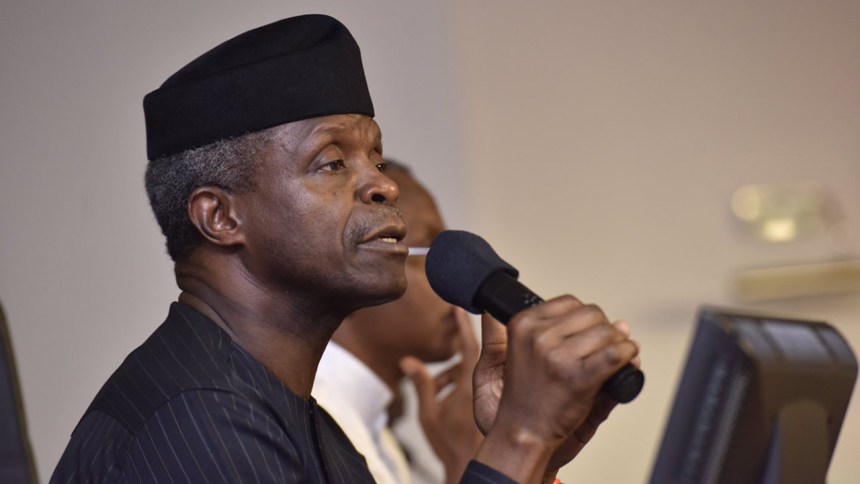In a manner akin to clamouring for restructuring, the National Economic Council, NEC, has set up a committee in the six-geopolitical zones of the country to decentralise the operations of the Nigeria Police Force.
This came as National Security Adviser, NSA, Babagana Monguno, said that the ongoing security challenges in the country was asymmetric which cannot be overcome within a short period.
This is even as the Nigeria’s Governors Forum, NGF, has hired the services of lawyers to challenge the intrusion in the security votes of state governors.
Briefing State House correspondents after the monthly NEC presided over by Yemi Osinbajo, the Acting President, at the Council Chamber, Presidential Villa, Abuja, Thursday, Monguno also said that the Federal Government was looking at security issues coming from outside the country.
He explained that Ibrahim Idris, the Inspector-General of Police, will head the decentralization of the operations of the committee.
NSA also stated that the security heads, while briefing NEC, harped on the need for states to collaborate and support the federal government in the determined efforts to deal with each security threat even as he decried lack of synergy among security heads.
He, however, noted that in the last few weeks, there have been some understanding amongst the security operations, adding that the improvements in the security situations in the country in recent times has nothing to do with the forthcoming general elections.
Monguno said, “I briefed on behalf of the security agencies both operational and intelligence. I gave a general overview of the security situation in the country, the current situation and the trends and also the challenges that we are confronted with.
“These threats are increasingly asymmetric in nature and I stressed upon the need the deal with these problems in a more collective manner. It is true that it is the responsibility of the security agencies to deal with these threats, but the complexities of insecurity in the 21st Century are such that you need a whole of government and a whole of society approach in dealing with these issues.
“I emphasised to the council the need for the state to collaborate with and support the federal government in dealing with each individual threats and these threats differ from one zone to another and find a way of linking with security agencies so that we can find a lasting solution.
“These things cannot be overcome within a short period that is the hard truth. What we have decided to do is to work on certain methods.
”For example, the council decided that a committee would be set up with representation from each of the geo-political zones to be chaired the IGP so that we find ways of decentralizing police operations so that there will be greater access to information and handling this situation will be easier rather than a centralized and cumbersome approach.
“We also reviewed the resolutions and recommendations of the 2017 Security Summit after which the state governors agreed to work with the security agencies on all the issues that were raised and all the recommendations will be revisited.
“The Federal Government is also looking at other issues in dealing with problems coming from outside the shores of this country. These problems are being collated by the security agencies and a team would set up under the supervision of the Office of the National Security Adviser to deal with these threats.”
Asked whether the recent improvement recorded in security situation was a result of the forthcoming, elections, he said the success so far recorded was coincidental and had nothing to do with the elections.
”What happened is that there has been continuous review of the activities of the various security agencies, successes and failures and so on and so forth. There has been deliberate attempt to try and take care of those areas that are most difficult.
”The fact that we have started making a breakthrough is just coincidental with the fact that elections are approaching.
”Several new operations have been launched, these operations are being reviewed in a more coordinated manner with other agencies that are not directly within the military component but with other MDAs and that have resulted in improvement and it has nothing to do with elections approaching,” he said.
On why there was no coordination among security agencies on the invasion of Benue State by policemen and that of the National Assembly by operatives of the Department of State Services, DSS, he said, the issue was being addressed.
He said, “On lack of coordination, it is not easy to coordinate. Yes, all security agencies are supposed to be centrally coordinated but sometimes we have issues. But these issues are being addressed right now and that is probably why we are beginning to see some improvements.
“The truth is that we are dealing with a situation that is asymmetric, that is not normal, not conventional. In dealing with these problems there will be issues, inter-service issues, inter-agencies issues, my office has been trying to address in the last couple of weeks, hopefully we should be able to see some improvements.”
Also fielding question on what government was doing on the report by Red Cross that over 17,000 Nigerians were missing, he said the allegation was being looked into by relevant agencies of government.
He said, “That report is being looked at by by different agencies of government and we are awaiting their report before we can comment on that.”

